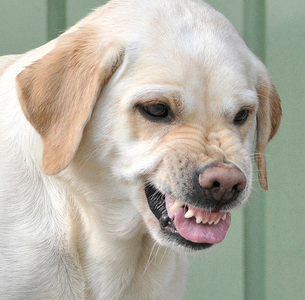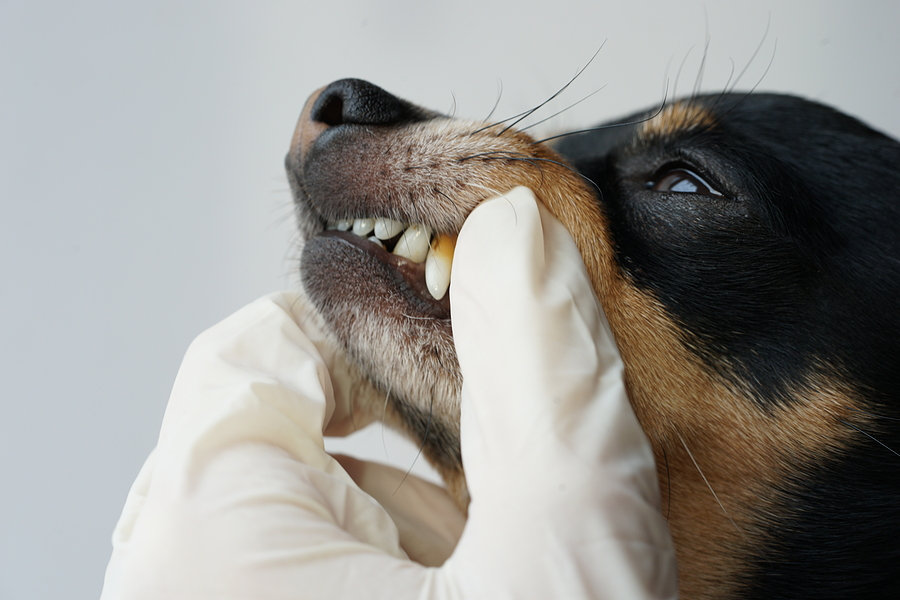Just like human babies, puppies go through the teething process as they transition from their baby teeth to their permanent adult teeth. It's an essential developmental stage for our furry companions, a dog's adult teeth, and as responsible pet parents, it's crucial to be aware of when a puppy lost tooth.
In this article, we'll dive into the fascinating world of puppy teething, exploring the teething timeline (when puppy lost tooth), common behaviors, dental care, and tips to ensure your puppy's dental health remains in top shape.

Puppy Teething 101: Understanding Baby Tooth and Adult Teeth
Puppies are born toothless, and their first baby teeth, also known as puppy milk teeth or deciduous teeth, typically start to emerge around three weeks of age.
These temporary baby teeth play a crucial role in a puppy's early development, allowing them to chew soft puppy food and explore the world around them. As they reach around four to six months of age, puppies start to lose their baby teeth as their permanent adult teeth emerge, much like human babies.
The Puppy Teething Timeline: When Puppies Lose Their Baby Teeth
Around three to four weeks old, a puppy's baby teeth start making an appearance. The first baby tooth, incisors, which are small teeth at the front of the mouth, are the first to emerge, followed by the canine teeth and then the premolars. By eight weeks of age, most puppies will have their first set of baby teeth fully in place. However, as their adult teeth develop, the baby teeth will begin to fall out.
Around four to six months of age, the puppy's adult teeth will start to push out the baby and permanent teeth, causing puppies teeth fall out gradually. This process can sometimes lead to discomfort and irritation, prompting the puppy to chew on objects to relieve the discomfort until permanent teeth appear.
Recognizing Excessive Chewing Behavior: Chewing is Normal
During the teething process, puppies may exhibit normal behaviors like excessive chewing, which is completely normal.
Chewing helps alleviate the discomfort they feel as their new teeth emerge and their baby teeth fall out. To prevent destructive chewing, provide safe chew toys for your puppy to gnaw on. These toys can help soothe their sore gums and prevent them from turning to your furniture or belongings.
Caring for Your Puppy's Teeth: Dental Hygiene is Essential
Just as dogs like humans, dogs require proper dental care to maintain good oral health.
As soon as your puppy starts teething, it's essential to begin a dental care routine to ensure healthy puppy teeth fall a clean and adult tooth and gums throughout their life.
Daily Teeth Brushing:
Introduce your puppy to teeth brushing early on. Use a finger brush or a soft-bristled toothbrush designed for dogs, and never use human toothpaste, as it may contain ingredients that are harmful to pets. Instead, opt for toothpaste formulated specifically for dogs.
Dental Chews and Toys:
Offer safe toys and dental treats to promote teeth cleaning and reduce plaque buildup. Frozen toys can be especially soothing for teething puppies.
Regular Dental Check-ups:
Schedule regular dental check-ups with your veterinarian. Professional dental cleanings are crucial to prevent dental diseases and maintain your puppy's oral health.

The Importance of Proper Dental Care for Adult Dogs
As your puppy's adult teeth come in, it's essential to continue proper dental care. Neglecting your dog's dental health can lead to periodontal disease permanent tooth,, bad breath, and other dental problems.
Regular check-ups are necessary to prevent these issues and ensure your furry friend's overall well-being.
Dealing with Challenges: Tips for Handling Teething Puppies
While puppy teething is a natural process, it can present some challenges for pet parents. Here are some useful tips to help you navigate through this phase with ease:
Provide Appropriate Chew Toys:
To satisfy your teething puppy's natural urge to chew, offer a variety of safe and durable chew toys for teething puppy.
Look for toys specifically designed for teething puppies, made from materials that won't splinter or break easily. Rope toys, rubber toys, and soft plush toys are excellent options for soothing their sore gums.
Frozen Treats and Toys:
Frozen treats or toys can be a lifesaver during the teething process.
Consider freezing some dog-safe fruits, like sliced apples or carrots, in water to create refreshing and soothing chew treats. Alternatively, freeze some of their chew toys to provide relief to their inflamed gums for a puppy of months of age.
Avoid Giving Inappropriate Chewing Objects:
During the teething baby process, avoid giving your puppy items that could be harmful if chewed for the puppy's mouth, such as socks, shoes, or household objects. These items can pose a choking hazard and may encourage inappropriate chewing habits even after teething is complete.
Regular Dental Check-ups:
Regular visits to your veterinarian for dental check-ups are essential to monitor your puppy's dental health and identify any potential issues early on. Your vet can also provide recommendations on dental care tailored to your puppy's specific needs.
My children like playing rough with the puppy, and they say that they don't mind the occasional scratch or gentle bite. Is this okay?
Puppy Teething vs. Dental Issues: Knowing the Difference
While puppy teething is a natural process, it's essential to differentiate between typical teething behavior and signs of dental problems.
If your puppy displays any of the following symptoms, it's best to consult your veterinarian:
Excessive Drooling:
Some drooling is normal during teething, but excessive drooling could indicate an underlying dental issue.
Loss of Appetite:
If your puppy shows a sudden loss of appetite or reluctance to eat, it could be a sign of dental discomfort.
Bleeding or Swollen Gums:
Occasional small spots of blood on toys or in your puppy's mouth may be normal during teething. However, persistent bleeding or swollen gums should be checked by a veterinarian.
Pain or Discomfort:
If your puppy appears to be in significant pain or discomfort, consult your vet to rule out any issues that may be causing distress.
Enjoy Daily Teeth Brushing, FAQs About Puppy Teething:
Should I brush my dog's teeth?
Yes, you should brush your dog's teeth regularly as part of their dental care routine. Just like humans, most dogs are susceptible to dental issues such as plaque buildup, tartar formation, and gum disease.
When do puppies start teething, and when do they lose their teeth?
Puppies start teething at around three to four weeks old when their baby teeth, also known as mother's milk teeth or deciduous teeth, begin to emerge. By four to six months of age, the puppy's adult teeth will start pushing out the baby teeth, and they will gradually fall out.
How can I tell if my puppy is teething?
Teething puppies may exhibit common behaviors such as excessive chewing, drooling, irritability, and a preference for soft foods. You may also notice their gums becoming red and swollen as their new teeth emerge.
What can I do to help soothe my teething puppy's discomfort?
To alleviate your puppy's teething discomfort, offer safe chew toys made from durable materials. Frozen treats or toys can also provide relief to their sore gums. Regular playtime and exercise can help divert their attention from discomfort.
How should I care for my dog's teeth properly during the teething process?
During teething, continue to brush your puppy's teeth regularly at early age using a soft-bristled toothbrush or finger brush and dog-specific toothpaste. Provide dental chews and treats that promote teeth cleaning and reduce plaque buildup on puppy teeth. Schedule regular dental check-ups with your veterinarian to ensure proper dental care.
When do puppy teeth fall out?
As puppies reach around four to six months of age, their adult teeth will begin to push out the baby teeth, causing them to fall out. The incisors are usually the first to fall out, followed by the canine teeth and premolars. This process continues until all of the puppy's baby teeth have been replaced by their permanent adult teeth.
Is excessive chewing during teething a cause for concern?
Excessive chewing during teething is a normal behavior for puppies. It helps relieve discomfort and aids in the teething process. However, if the excessive chewing continues even after teething is complete, it may be a sign of boredom or anxiety, and you should consult your veterinarian for guidance.
Are there specific dental issues that puppies are prone to?
Puppies, like adults dogs, can be prone to dental issues such as periodontal disease and dental plaque buildup. Regular dental check-ups, a proper dental dog's mouth, and appropriate chew toys can help prevent these issues.
Is it necessary to brush my puppy's teeth daily?
Yes, daily teeth brushing is essential for your puppy's dental health. Regular brushing helps prevent plaque buildup and maintains good oral hygiene. Introduce teeth brushing to your puppy at an early age to make it a positive and routine part of their care.
